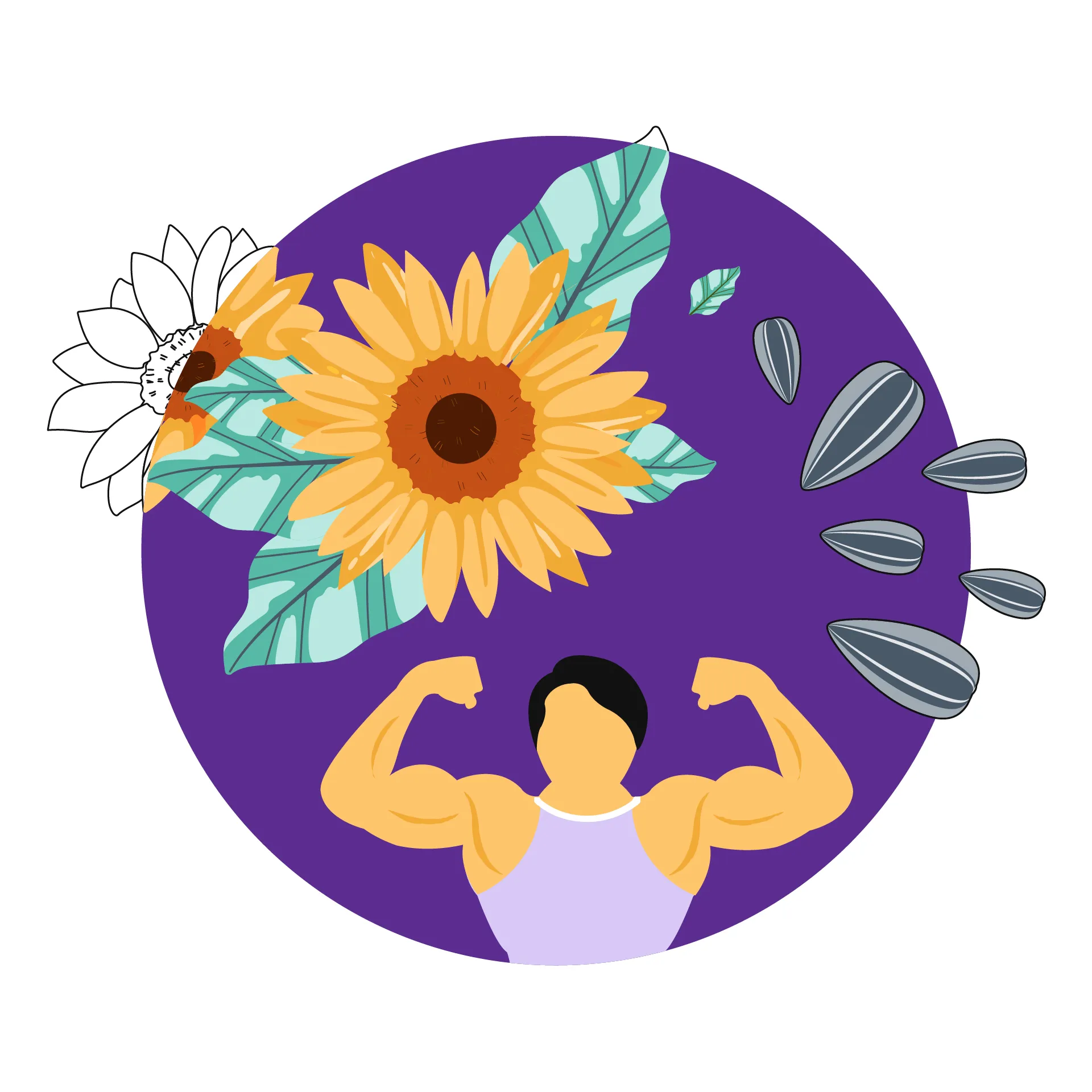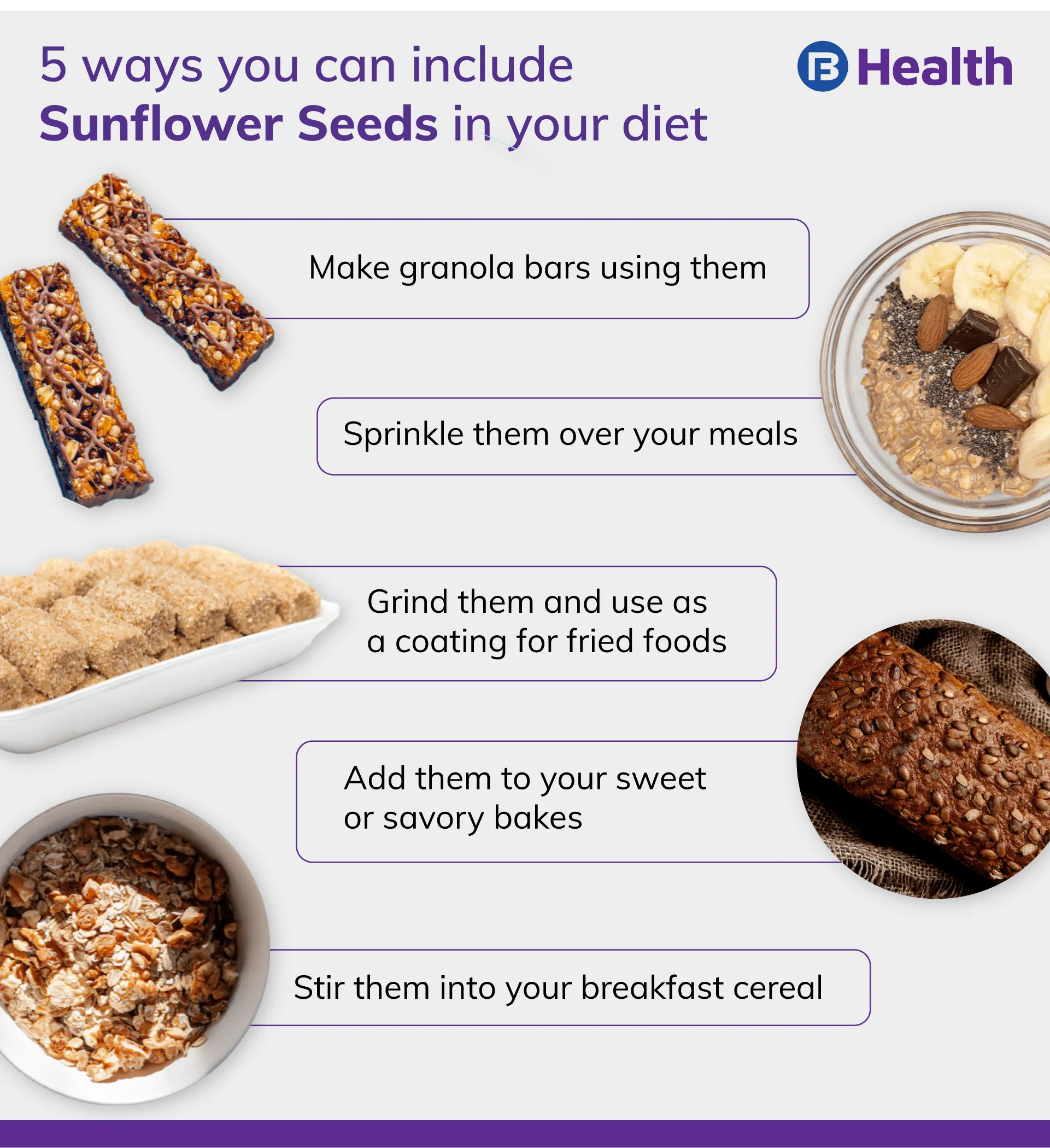Nutrition | 9 min read
Sunflower Seeds: Benefits, Comparison with Pumpkin Seeds, Uses
Medically reviewed by
Table of Content
Key Takeaways
- Sunflower seeds are rich in fats, mineral, vitamins, & plant components
- Sunflower seeds benefits include increased energy, better bone & heart health
- Sunflower seeds’ nutrition components include vitamin B, fats, and selenium
Harvested from the flower heads of sunflowers, sunflower seeds are a nutritious snack. They are crunchy and have a delicious, nutty taste! They are rich in plant components, fats, vitamins and minerals. All of this makes them a great addition to your meal. Sunflower seeds are also used to make oil. The shells of these seeds are inedible, so make sure you don’t eat any. These seeds give you energy and are one of the top immunity booster foods.
Read on to know more about the 7 sunflower seeds' benefits for your health.
Nutritional Value of Sunflower Seeds
The energy in sunflower nuts is high. These seeds contain the following nutrition per 100 grams:
- 585 calories
- Lipids (8.5 g), the majority of the lipids are polyunsaturated and monounsaturated
- Fats (51.5 g)
- Protein (20.77 g)
- Vitamins like thiamine, riboflavin, niacin, pantothenic acid, folate, choline, vitamin B6, vitamin C, and vitamin E
- They contain elements such as calcium, iron, magnesium, manganese, phosphate, potassium, sodium, zinc, and many more
- Consuming sunflower seeds also gives us access to antioxidant-rich plant components like flavonoids and phenolic acids
Sunflower Seeds vs Pumpkin Seeds
Sunflower and pumpkin seeds are very nutritious and healthful, but sunflower seeds are superior on many levels.
| Sunflower Seeds | Pumpkin Seeds |
| Sunflower Seeds are the extract of fruit sunflower | Pumpkin Seeds are the eatable seeds of pumpkin and squash |
| The Sunflower seeds look flat and oval in shape | The Pumpkin seeds look flat and oval in shape |
| The Sunflower seeds are smaller and thicker | The Pumpkin seeds look larger and thinner |
| The Sunflower seeds are white-coloured and black-coloured seeds are also available | The Pumpkin seeds are in light green colour with a white husk outside |
| These seeds contain 4.7 percentage of water content | These seeds contain 4.5 percentage of water content |
| The Sunflower seeds contain 584 calories per 100 grams | The Pumpkin seeds contain 446 calories per 1000 grams |
| These seeds are higher in Iron, Magnesium, Manganese, copper, selenium, phosphorus | These seeds are higher in Zinc, potassium, choline |
| Sunflower seeds contain low fibre | The pumpkin seeds contain high fibre |
| These seeds contain more fat content than the pumpkin seeds (almost 2 times) | These seeds contain an ample amount of fat content (most healthy fat) |
Sunflower Seeds Benefits

Cancer Risk Reduction
Sunflower seeds contain a phytosterol called beta-sitosterol, which aids in the prevention of breast cancer. It suppresses the development of tumor cells, shrinks the extent of the tumor, and also stops metastasis. Plant sterol, which is an anti-breast cancer-preventive component, is abundant in sunflower seeds. which has been discovered to have an impact on limiting the size and growth of malignant tumors inside the body.
Improve Brain Activity
Vitamin B6 is present in sunflower seeds. It elevates mood, increases focus, and sharpens recall. It causes our body to produce serotonin and adrenaline.
Natural Aids for PMS
Sunflower nuts also aid in reducing premenstrual syndrome signs (PMS).
Promotes Unwanted Development of Cancer Cells
Strong antioxidants found in sunflower seeds decrease the chance of developing cancer. Consuming these seeds lowers the chance of developing colorectal cancer as well.
Consuming enough magnesium levels of calcium influence on the control of nerve and muscular movements. Magnesium aids in maintaining the tranquillity of our neurons and muscles, preventing high blood pressure, migraines, cramps, stress, soreness, and exhaustion.
Aids in Weight Loss
Sunflower seeds are a good source of carbohydrates and protein. They prolong our feeling of fullness, causing us to eat less, ultimately resulting in fewer calories being ingested. This aids in weight loss.
These slightly fragrant seeds are rich in polyunsaturated lipids, also known as healthy fats. They are a beneficial supplement to a nutrition plan for losing weight. These seeds can be a wise choice for long-term weight reduction because they are loaded with protein, fibre, and important nutrients like vitamin E, folate, and copper. These seeds must first be split open because of their tough covering and can be added to soups, drinks, and salads.
Lowers Your Cholesterol Levels
The fiber in sunflower seeds helps in reducing your LDL or bad cholesterol levels. The vitamin B3 and niacin present in them also helps reduce your total cholesterol levels. They also contain another B vitamin, vitamin B5, which helps increase your HDL or good cholesterol.
Additional Read: Foods to Lower CholesterolKeeps Your Heart Healthy
One of the biggest risks to your heart health is high blood pressure. It can lead to a stroke or a heart attack. This makes maintaining and improving your heart health important. Sunflower seeds have linoleic acid that helps make a compound to block enzymes. These enzymes cause your blood vessels to constrict. The fiber, fatty acids, and vitamins of sunflower seeds also help reduce your risk of a heart condition [1].
Helps Fight Inflammation
Chronic inflammation increases your risk of chronic conditions. This is why it is important for you to eat foods that help you fight inflammation. Increased levels of C-reactive protein (CRP) is one of the signs of acute inflammation. These increased CRP levels may also lead to an increased risk of type 2 diabetes and heart disease [2]. The high vitamin E content of sunflower seeds helps lower the C-reactive protein levels [3]. Other than this, the plant components and flavonoids present in them also help.
Supports Your Immune System
Vitamin E, selenium, and zinc present in sunflower seeds make them one of the best immunity booster fruits. Vitamin E provides protection against infections and boosts your immune response. It is also an antioxidant and helps prevent the damage caused by free radicals. Selenium helps enhance your immunity and decrease oxidative stress caused by free radicals. Zinc helps prevent infections and increase immunity.
Raises Your Energy Levels
The high protein level of sunflower seeds helps keep your energy levels up. Selenium and vitamin B present also help maintain your energy. Selenium helps by increasing the blood flow and delivering more oxygen. Vitamin B1 helps your body convert food into energy to keep you active throughout the day.
Helps M Diabetes
Sunflower seeds have a plant compound, chlorogenic acid. Research suggests that chlorogenic acid may help reduce blood sugar levels [4]. Sunflower seeds also have vitamin B, E, antioxidants and more which help control your blood sugar. These benefits make these seeds good for managing diabetes.
Improves Your Bone Health
Osteoporosis is one of the conditions that affect women more than men. Women are 4X more likely to be affected by this condition [5]. Better bone health is one of the sunflower seeds benefits for females. These seeds contain calcium, magnesium, and phosphorous. These minerals improve and maintain your bone health.
Additional Read: Calcium for WomenKeeps Your Skin Healthy
Sunflower seeds also have omega-6 fatty acids making it good for your skin. Fatty acid deficiency may affect your skin appearance and function. These fatty acids also help reduce the effects of skin aging and help prevent certain skin conditions.
Like every good thing, these seeds also have potential downsides if you have them in excess. These side effects are:
- Increasing your sugar and sodium levels because of high calorie and sodium content
- Causing stool blockage due to consumption of inedible shells
- Increasing the risk of salmonella because of high bacteria in sprouted seeds or home-grown seeds
Sunflower seeds’ nutrition value make them a great addition in your nutrition therapy. Talk to your nutritionist to see how best to have them for better health. Along with their benefits, keep the possible side effects of sunflower seeds in mind. Contact a doctor immediately if you see any signs of infection, kidney disease, or high sugar. Book teleconsultation on Bajaj Finserv Health. Using the doctor near me feature and other filters, you can find and be treated by the best specialists with convenience.
Side Effects of Sunflower Seeds
Sunflower seeds undoubtedly have many health benefits, but they also have a few drawbacks. Large quantities of toasted sunflower seeds can have negative health impacts. For instance,
- It might affect how well the organs work. High amounts of phosphorous in sunflower nuts can harm kidney function if eaten excessively
- A maximum of half a cup of these seeds should be consumed each day to ensure that the body receives all the necessary nutrients and benefits without suffering any negative effects. Additionally, overindulging can make you put on weight
- These seeds are so delectable that it's easy to overindulge while thinking of them as a healthful snack. Although beneficial, going overboard can negate those advantages and create issues
- Sunflower seed overconsumption may result in nausea, diarrhoea, and gastrointestinal aches
- People who are sensitive to sunflower seeds may experience symptoms such as nausea, skin rashes, difficulty inhaling, puffiness and irritation in the lips, etc.
- Cadmium is found in small amounts in sunflower kernels. Our organs may suffer from it if we consume too many nuts
- Eating tainted sprouted seeds could make you sick with germs
How to Consume Sunflower Seeds?

Normally offered with their shells on, sunflower seeds can be consumed either raw or roasted. When eating those that are still in the shell, it is customary to split them with your teeth before omitting out the shell, which is improper to consume. Baseball tournaments and other outdoor sporting events are where these seeds are most frequently consumed as a refreshment.
Sunflower seeds can be included in a range of recipes. You can add them to dishes in the following ways:
- Add to the trail mix
- Add to your own-made cereal cookies
- Add some to a mix of green leafy vegetables
- Add to heated or lukewarm cereal
- Sprinkle over parfaits of fruit or yoghurt
- Include in stir-fries
- Add to chicken or tuna salad
- Over the veggies that have been sautéed
- Supplement vegetarian burgers
- Use in pesto instead of pine seeds
- Fish can be coated with ground sunflower seeds
- Add to cooked products like muffins and pastries
- Spread sunflower seed spread on an apple or a banana
When cooked, sunflower seeds may appear blue-green. This results from an innocuous chemical reaction between the chlorogenic acid in the seeds and the baking soda, but you can lessen this reaction by using less baking soda.
Finally, sunflower seeds are vulnerable to going rancid due to their high lipid level. Keep them in a sealed receptacle in your freezer or refrigerator to prevent rancidity.
References
- https://pubmed.ncbi.nlm.nih.gov/24959542/
- https://pubmed.ncbi.nlm.nih.gov/16357111/
- https://pubmed.ncbi.nlm.nih.gov/11053781/
- https://pubmed.ncbi.nlm.nih.gov/30249058/
- https://www.ncbi.nlm.nih.gov/pmc/articles/PMC5380170/
Disclaimer
Please note that this article is solely meant for informational purposes and Bajaj Finserv Health Limited (“BFHL”) does not shoulder any responsibility of the views/advice/information expressed/given by the writer/reviewer/originator. This article should not be considered as a substitute for any medical advice, diagnosis or treatment. Always consult with your trusted physician/qualified healthcare professional to evaluate your medical condition. The above article has been reviewed by a qualified doctor and BFHL is not responsible for any damages for any information or services provided by any third party.




